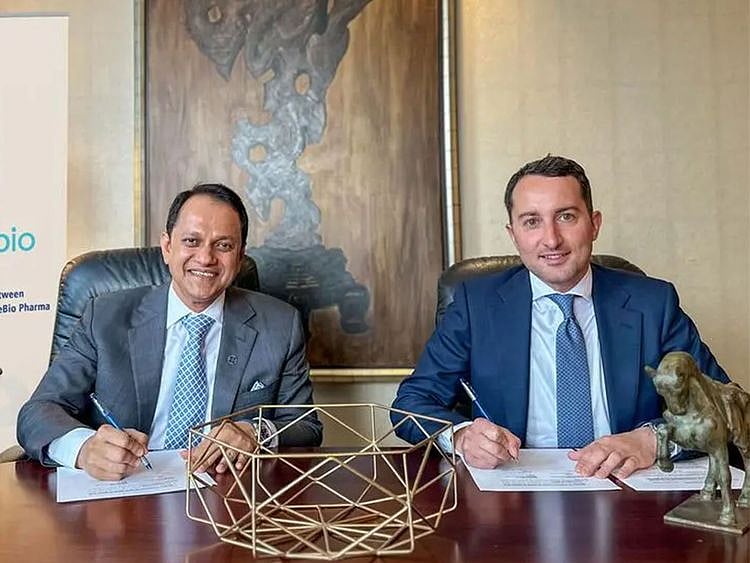Burjeel launches new project to identify rare diseases in Abu Dhabi
Project NADER aims at early diagnosis, treatment to improve patient outcomes

Abu Dhabi: Supported by the Department of Health – Abu Dhabi, Burjeel Holdings has partnered with US-based biopharmaceutical company BridgeBio Pharma to launch Project NADER to identify rare diseases in the MENA region and provide patients with leading healthcare options. Clinical trials for Project NADER are to be conducted in Abu Dhabi.
The two entities signed a preliminary, non-binding collaboration agreement establishing a mutual intention to work together on project NADER (Needs Assessment and Therapeutics Development for Rare Diseases – ‘nader’ meaning ‘rare’ in Arabic). Genetic in origin, these often life-threatening or chronically debilitating diseases affect a small percentage of the population and are present throughout the person’s entire life, even if symptoms do not immediately appear.
Project NADER aims to revolutionise the field of early diagnosis and treatment in order to improve patient outcomes. Both entities intend to collaborate on identifying patients with several rare diseases including achondroplasia, hypochondroplasia, FGFR-driven craniosynostoses, autosomal dominant hypocalcaemia type 1, limb girdle muscular dystrophy type 2I, congenital adrenal hyperplasia, Canavan disease, propionic academia, methylmalonic academia, pantothenate kinase associated neurodegeneration and others as mutually agreed.
Even though these rare diseases affect a small percentage of the population and can present with non-specific signs and symptoms, they are often misdiagnosed or only diagnosed later in the disease course after severe complications manifest. Accurate and early diagnosis are crucial to starting intervention promptly and avoiding disease progression. The project will also allow identification of patients who have already been diagnosed but do not currently have access to cutting edge therapies or clinical trial options.
In the first phase of project NADER, the two entities intend to utilise innovative risk assessment algorithms that will be deployed through the healthcare provider’s secure internal data to identify patients at risk for specific rare diseases. Expectations for future phases of the project include analyses of vast amounts of data to identify patterns and markers associated with the diseases and generate personalised risk scores for patients followed by genetic testing to confirm the diagnosis of identified potential patients.
The project also aims to run awareness campaigns and education activities about such rare diseases, to further support the mapping activity and encourage local collaborations from other healthcare providers. Burjeel Holding will deploy the project across its widespread hospitals and medical centres across the UAE as part of routine diagnostic care, with plans to expand the project through its growing healthcare infrastructure in the region. Local partnerships will also be sought to facilitate wider implementation.
Dr. Asma Ibrahim Al Mannaei, Executive Director of the Research and Innovation Center at the Department of Health – Abu Dhabi (DoH), said: “As part of our ongoing efforts to advance early diagnosis and treatment, the Department of Health – Abu Dhabi is proud to witness yet another leading partnership aimed at propelling transformative medicine to safeguard the health and well-being of community members.
Reinforcing Abu Dhabi’s position as a leading destination for life science and innovation, we remain committed to empowering healthcare providers in the emirate with the means to lead research studies and conduct clinical trials to map out a path towards discovery and breakthrough healthcare in the emirate and beyond. Similar initiatives translate the department’s vision in securing health for all while accelerating healthcare outcomes for the benefit of the global community.”
John Sunil, CEO of Burjeel Holdings, said: “Project NADER marks a significant milestone in our commitment to delivering the best possible care to our patients. It brings together Burjeel’s expertise in healthcare delivery and outreach and BridgeBio’s vast expertise in delivering breakthrough therapies for rare diseases. By combining our strengths, we seek to address the challenges faced in identification of rare diseases, which often go undiagnosed until symptoms become severe. The project will enable early interventions whether in the form of established treatments or novel therapies.”
The first phase will aim to set the roadmap to providing novel treatment options for identified patients through clinical trials.
Dr. Khaled Musallam, Group Chief Research Officer of Burjeel Holdings and project lead, said: “Many rare diseases are highly clustered in our region due to our unique genetic pool. These diseases are often lost in the system or have very limited treatment options. Our ultimate goal from project NADER is to link patients to evolving treatment options through clinical trials of small molecules and gene therapies. The first step to bringing such innovative solutions to our region is to identify disease burden and patients’ unmet needs.”
Neil Kumar, Ph.D., BridgeBio founder and CEO, said: “Building on our already established foundation of genetic disease patient care, we hope that BridgeBio can help bring more patients access to novel treatments, clinical trials, and capabilities alongside a strong partner like Burjeel, and so we are grateful to be working with them to expand our efforts in the MENA region. The BridgeBio vision is to serve patients around the world, and this is an important step in that direction.”
As the collaboration unfolds, both Burjeel Holdings and BridgeBio anticipate significant progress in the field of rare diseases in the region. The project could also provide patients in the region with increased access to BridgeBio’s state-of-the-art pharmacologic and gene therapies that are currently in development.
Sign up for the Daily Briefing
Get the latest news and updates straight to your inbox
Network Links
GN StoreDownload our app
© Al Nisr Publishing LLC 2026. All rights reserved.